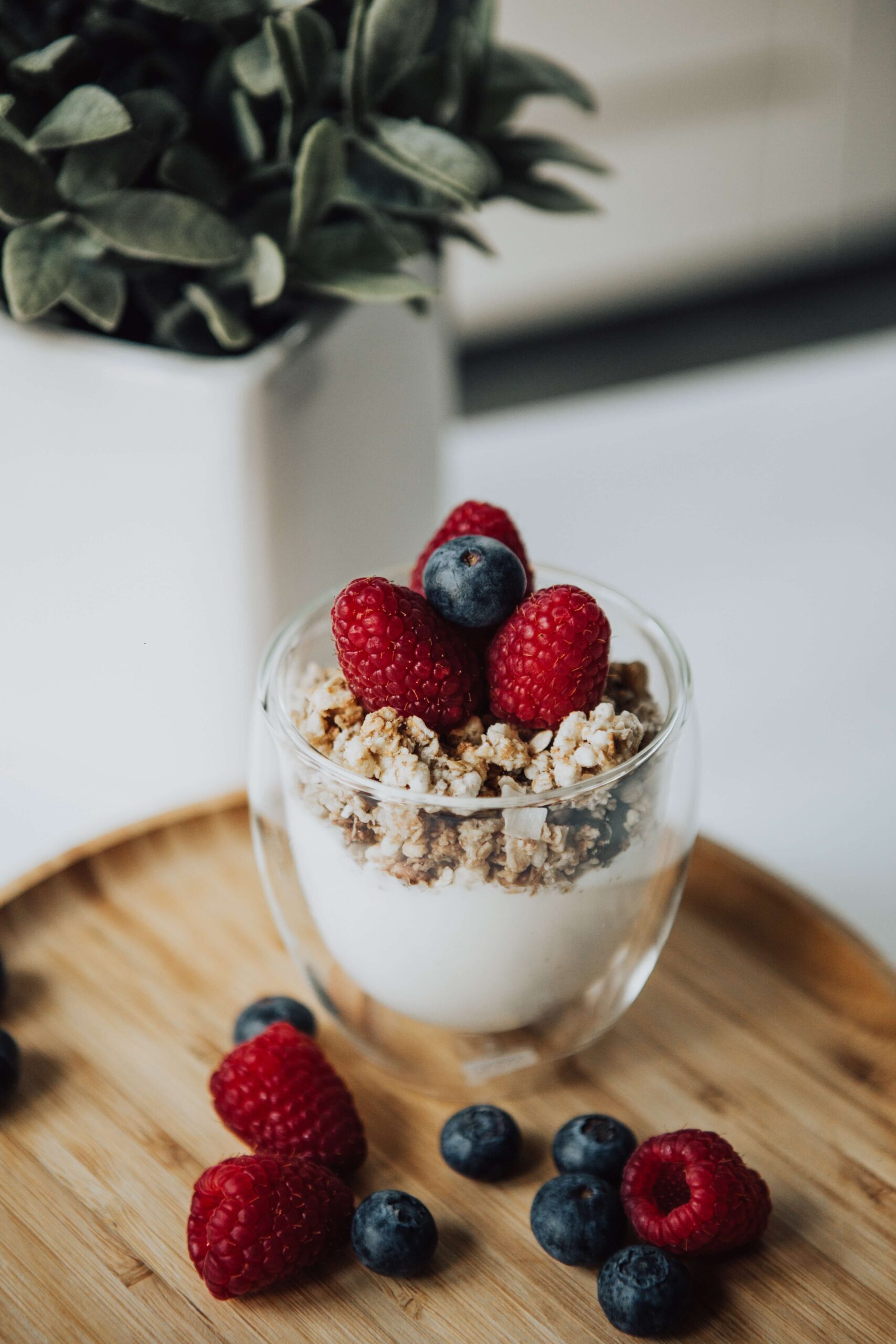Introduction to the Gut Microbiome
Hello friend!
Did you know that the lining of your gut, like every surface of your body, is covered in microscopic creatures (living bacteria)? These organisms create a micro-ecosystem called the microbiome. And though we don’t really notice it’s there, it plays a tremendous role in your health and can even affect your mood and behavior.
Everyone’s microbiome begins developing at birth and changes throughout your life based on lifestyle factors and the environment you grow up in. Your gut microbiome is so unique to YOU that even identical twins have variances in their gut bacteria diversity.
Many of these little guys are actually really helpful, and we have a somewhat symbiotic relationship with them. We give them shelter and nutrients, and they help to break down certain foods and produce different neurotransmitters: most of our serotonin for instance is produced in the gut!
Nourishing a Healthy Gut
Not surprisingly, what you feed your microbiome may have the biggest impact on it’s health. And the healthier it is, the healthier you are. The key to a healthy microbiome is nourishing a balance among the nearly 1,000 different species of bacteria in your gut.
There are two ways to maintain this balance — helping the microbes already there to grow by giving them the foods they like (prebiotic) and adding living microbes directly to your system (probiotic).
Fiber
30 grams of fiber are recommended as part of a cancer prevention lifestyle.
In general, having a varied diet rich in different types of fruits and vegetables is recommended for a healthy gut and a reduced risk for colon cancer.
High fiber foods –
- Whole grains (whole wheat bread, whole wheat pasta, brown rice, quinoa, oatmeal, corn, etc.)
- Nuts and seeds (flax, chia, sunflower, almonds, walnuts, peanuts, pistachios, brazil nuts)
- Fruits (bananas, apples, blueberries, raspberries, cherries, peaches, oranges, melons, mango, and more!
- Vegetables : celery, carrots, potatoes, peppers, tomatoes, spinach, cabbage, kale, cucumber, zucchini, okra, sugar snap peas, etc
- Legumes: beans – kidney, soy, black, navy, northern, chickpeas, lentils, peas, lima beans
How do you have a fiber rich diet?
- Aim for 5+ servings/cups of fruits and vegetables daily
- Snack on 1-2 oz of nuts and seeds
- Incorporate meatless meals or substitute half of the meat in a recipe with legumes (lentils, beans, peas)
- Enjoy 6 servings of whole grains: this can add up by having 1 cup of oatmeal in the morning, one sandwich on whole wheat at lunch, and 1 cup of brown rice with dinner.
Prebiotics
These are foods that are associated with specifically nourishing the beneficial bacteria in our guts. All prebiotics are fiber, but not all fiber-rich foods are prebiotics.
Prebiotic rich foods
- Apples
- Asparagus
- Bananas
- Onions
- Garlic
- Oatmeal
- Jicama
- Leeks
Probiotics
These foods contain live strains of bacteria that are associated with a healthy diversity in the gut microbiome.
Certain cancer treatments can affect your gut microbiome. Your doctor may recommend that you take a high quality, third-party tested probiotic supplement to replenish the good bacteria after treatment (but get as many probiotics from food first).
Probiotic rich foods:
- Tempeh
- Kimchi
- Pickles
- Sour cream
- Miso soup
- Sauerkraut
- Kefir
- Yogurt
Confused about the difference between prEbiotics and prObiotics? Think “E” as in eat – what feeds the bacteria. Think “O” as in an organism – the live bacteria you can eat to support a healthy gut microbiome.
Gut Bacteria and Cancer
The world of gut microbiome research is relatively new and constantly growing. There is a general idea of which types are associated with increased/decreased risks for chronic diseases, but there is still tons we don’t know.
Current research suggests that certain behaviors support a healthy gut microbiome. This includes getting a diet rich in fiber and plant diversity. Fermentable forms of dietary fiber feed the good bacteria in your gut which then produce short chain fatty acids. These compounds help to reduce inflammation.
Imbalances in the Gut Microbiome
Unfortunately, sometimes different factors can cause an imbalance in the gut microbiome. The Standard American Diet (nicknamed SAD) is high in saturated fats, refined grains, and added sugars. It can lead to an overgrowth of certain strains of bacteria associated with increased inflammation and DNA damage in colon cells. Regularly consuming alcohol can also disrupt the balance of the gut microbiome.
How the microbiome and colorectal cancer may be related
- The short chain fatty acids produced by bacteria in the gut may help to increase expression of tumor suppressor genes.
- Different microbiome composition may affect how effective different cancer treatments are.
What else influences the gut microbiome?
Food alone does not dictate the balance in your gut!
- Stress/mood: Have you ever heard of the gut-brain access – the idea that your brain and your digestive system are all connected in more ways than you might imagine. Bacteria in your gut can influence your mood and, inversely, your stress levels can play a role in adverse GI symptoms. Ever get that nervous tummy ache before public speaking? That’s the gut-brain access in action! Prolonged stress has even been shown to reduce bacteria diversity in rats.
- Physical activity – regular exercise helps with microbiome diversity and bowel regularity! Inversely, sedentary behavior is associated with reduced microbiome diversity.
- Medications – Antibiotics may help take care of your infection, but they also reduce the bacteria in your gut! That’s why you may have some not no pleasant GI symptoms as a result of antibiotic treatment.
- Good sleep hygiene – Alterations in your sleep habits can drastically affect your gut health. Try to go to bed and wake up around the same time every day, and shoot for ~8 hours of sleep each night.
Takeaway
Although researching the gut microbiome is very promising, many of the findings related to supporting a healthy gut microbiome are similar to the basic recommended for most chronic diseases and overall health: plant rich diet, exercise, stress management, and proper sleep. Let’s get back to the basics to support a healthy gut and feel our best in every way!
If you enjoy learning more about taking care of yourself before, during, and after cancer treatment, then my Cancer Simplified Program is for you. You get tons of resources, recorded videos and practical tips to transform your life and make you the healthiest version of yourself. What are you waiting for? Click here and join today!
References
- ASCO. Your microbiome and cancer: What to know. Cancer.Net. January 4, 2022. Accessed August 12, 2023. https://www.cancer.net/blog/2020-12/your-microbiome-and-cancer-what-know.
- Collins K. Diet, the gut microbiome and colorectal cancer: Connecting the dots. American Institute for Cancer Research. April 3, 2023. Accessed August 12, 2023. https://www.aicr.org/resources/blog/diet-the-gut-microbiome-and-colorectal-cancer-connecting-the-dots/.
- Engen PA, Green SJ, Voigt RM, Forsyth CB, Keshavarzian A. The Gastrointestinal Microbiome: Alcohol Effects on the Composition of Intestinal Microbiota. Alcohol Res. 2015;37(2):223-36. PMID: 26695747; PMCID: PMC4590619.
- Tan H-E. The microbiota-gut-brain axis in stress and depression. Frontiers in Neuroscience. 2023;17. doi:10.3389/fnins.2023.1151478
This blog is not intended as medical nutrition therapy, medical advice, or diagnosis and should in no way replace consultation or recommendations from your medical professional.




